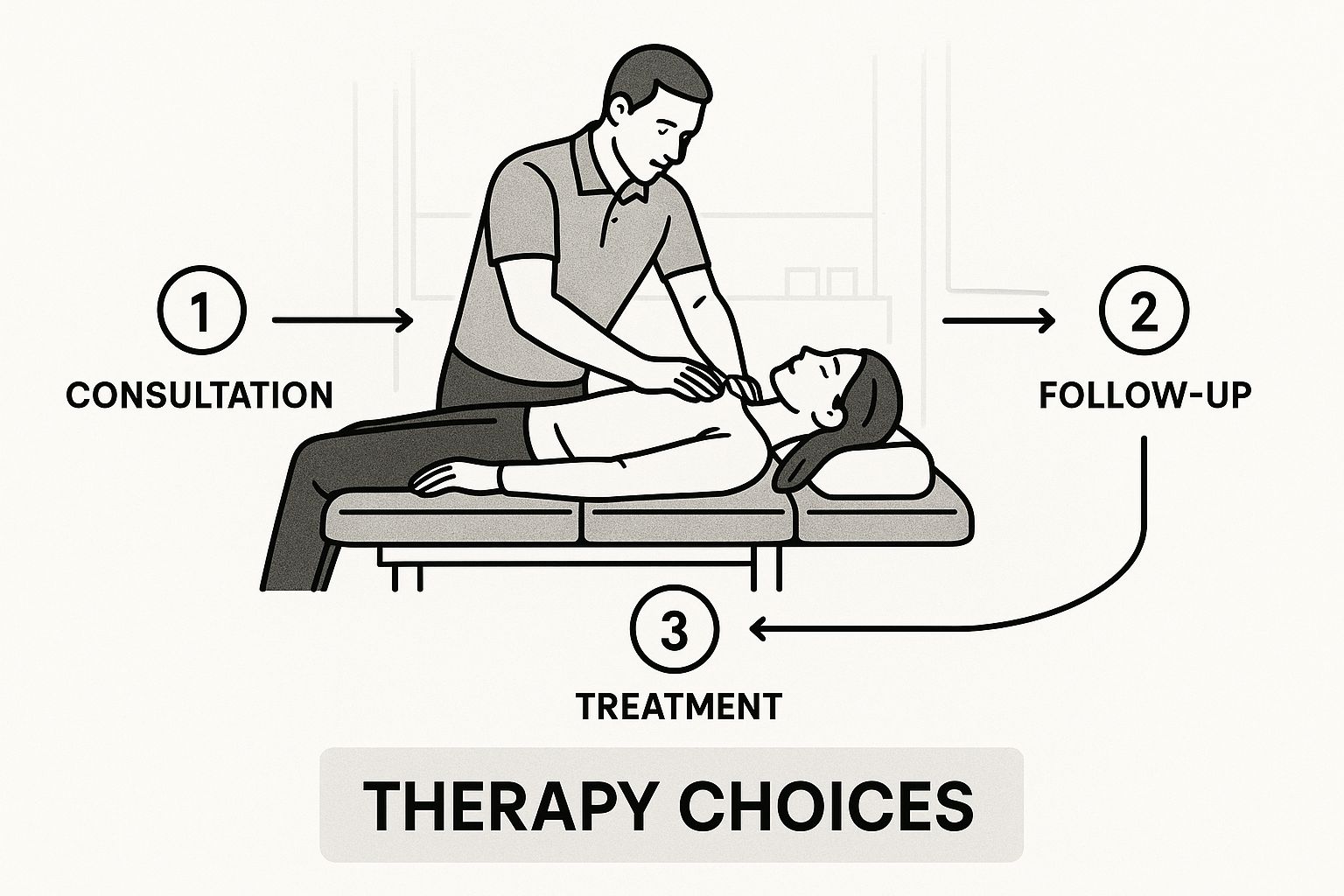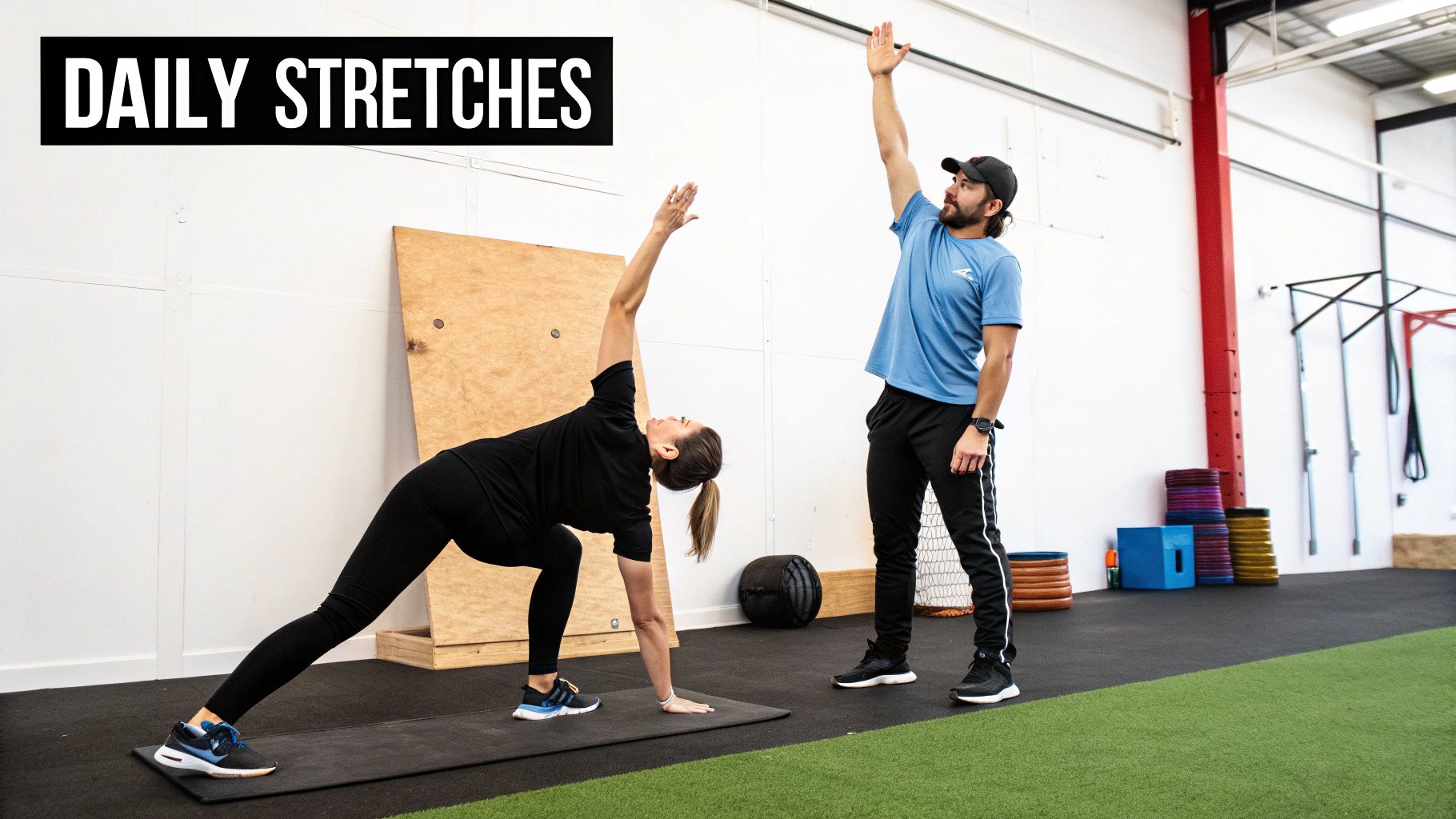That niggle in your lower back is more than just an annoyance—it's your body trying to tell you something isn't right. Figuring out when to stop toughing it out and actually search for a back pain clinic near me can feel like a big decision, but it’s often the best move you can make for real, lasting relief. This is about knowing when self-care has hit its limit and it's time to call in the experts.
Knowing When to See a Back Pain Specialist
It’s tempting to brush off back pain as a normal part of life, something to be managed with a hot bath or a couple of painkillers. And sure, minor strains from a weekend spent gardening often sort themselves out. But persistent discomfort that gets in the way of your daily life? That's a different story entirely. This is especially true here in the UK, where back pain is a massive issue.

Think about this: roughly 80% of us in the UK will have low back pain at some point. It’s incredibly common. Yet, only about one in five people with back pain will ever talk to their GP about it, which tells you a lot of us are just putting up with it when we don't have to.
Minor Aches vs. Major Problems
So, how do you know if you're dealing with temporary soreness or a problem that needs a professional eye? It really comes down to the duration, intensity, and the type of symptoms you're experiencing. Aches that hang around for more than a few weeks, or pain that’s so bad it stops you in your tracks, are definite red flags.
Keep an eye out for these warning signs that it's time to get a proper diagnosis:
- Pain that lasts more than six weeks: This is generally the point where acute pain starts turning into a chronic problem.
- Pain that gets worse when you rest: If lying down or sitting still brings no relief—or even makes it worse—there could be an underlying issue that needs investigating.
- Pain shooting down your leg: That sharp, electric-shock type of pain travelling from your lower back, through your bum and down your leg (often called sciatica) needs a proper assessment.
- Weakness, numbness, or tingling: Don't ignore these sensations in your legs or feet. They can signal nerve involvement that needs to be looked at sooner rather than later.
Getting your head around the specific symptoms associated with back pain that should prompt you to see a specialist is the first, most important step you can take.
Living with chronic back pain isn’t something you just have to accept. Seeing a specialist isn't admitting defeat; it’s a proactive choice to get your quality of life back and find a solution that actually works.
The Real Impact on Your Life
At the end of the day, the biggest clue is how much the pain is interfering with your life. Are you struggling to get a decent night's sleep? Have you stopped doing things you used to love, like going for a walk or playing with the kids? Is the pain making it hard to focus at work?
If you answered yes to any of those, your body is sending you a very clear message. The temporary fixes aren't cutting it anymore. It's time to find a professional who can get to the root cause of the problem and create a plan to get you back to living a full, active life without pain holding you back.
How to Effectively Find Local Back Pain Clinics
Starting the hunt for the right back pain clinic can feel overwhelming, but a few smart strategies will help you build a list of promising options. It’s about moving beyond a simple search for a "back pain clinic near me" to find real, quality care. A focused approach just works better and saves you a ton of time in the long run.
The first step? Get specific with your online searches. Instead of vague terms, use phrases that actually describe the kind of help you’re looking for.
For instance, searching for "spinal health clinic [your city]" or "musculoskeletal specialist near me" often points you towards more specialised practices. It’s a simple tweak, but it tells the search engine you need an expert in spinal and muscular issues, not just a general health centre.
Broadening Your Search Horizons
Google is a great starting point, but it shouldn't be your only tool. Relying on a few different channels is the best way to get a complete picture of who’s out there, helping you move from a massive, unfiltered list to a focused shortlist.
Think about these powerful alternatives:
- NHS Service Finder: While it's obviously for NHS services, you can sometimes find private practices that work alongside the NHS. It's another potential avenue worth exploring.
- GP Recommendations: Your GP is an invaluable resource. They have a network of trusted specialists and can often recommend a clinic that’s a good fit for your specific symptoms and history.
- Physiotherapist Referrals: Already seeing a physio? Ask for their opinion. They're deep in the musculoskeletal health world and usually know which local practitioners have the best reputation for getting results.
This image gives you an idea of the range of therapy choices available, helping you visualise the different paths your treatment could take.

As you can see, modern clinics often use a variety of gentle, hands-on techniques designed around what the patient actually needs.
To help structure your search, here's a quick breakdown of the most effective methods.
Effective Search Methods for Finding Local Clinics
This table outlines a few different ways to find potential clinics and highlights why each approach is useful.
| Search Method | What to Look For | Primary Benefit |
|---|---|---|
| Specific Online Searches | "spinal health specialist [town]", "manual therapy clinic near me" | Quickly identifies specialised practitioners over generalists. |
| GP Referral | Ask your doctor for their trusted contacts. | A recommendation based on your medical history and their professional network. |
| Physiotherapist Recommendation | Ask for clinics they trust for complex cases. | Insider knowledge from a professional in a related field. |
| Local Community Forums | Look for genuine, detailed patient experiences. | Unfiltered feedback and real-world stories from people in your area. |
Using a mix of these will give you a much more reliable list to work from.
Building Your Initial Shortlist
As you start gathering names from these different sources, just create a simple list. Don't get bogged down in deep analysis just yet—the goal right now is simply to collect potential candidates. Aim for a list of three to five clinics in your local area.
A well-rounded search is your best defence against choosing the wrong clinic. Combining online research with professional recommendations gives you a much clearer picture of the best options available to you.
Once you have this initial list, you're in a great position to start the next phase: digging into what each clinic actually offers. You can learn more about finding a back pain specialist near me and what to look for in our detailed guide. Putting in this groundwork now is what leads to an informed decision—and to effective, long-term relief.
Digging into a Clinic's Treatment Philosophy
Once you have a shortlist of clinics, it's time to look past the shiny exteriors. Finding the right back pain clinic near me is less about fancy marketing and much more about making sure their treatment philosophy lines up with what you actually need. This is where you put on your detective hat and start digging into their website to understand how they really approach patient care.

Think of a clinic's website as its digital front door. A good one will give you a clear window into its core values. Do they seem to push a one-size-fits-all solution, or do they talk about creating personalised, one-on-one plans? The best clinics are proud of their methods and are completely transparent about how they get results for people like you.
Can You Spot Patient-Centred Care?
Your mission here is to find a clinic that sees you as a person, not just another case file labelled "back pain." Keep an eye out for language that talks about a partnership between you and the practitioner. You’ll often find these clues hiding in plain sight in sections titled "Our Approach," "What to Expect," or "Our Philosophy."
Look for these green flags:
- A Focus on Root Causes: The clinic talks again and again about getting to the root cause of the pain, not just masking the symptoms. This is a huge sign they’re committed to lasting solutions.
- Real Patient Stories: They share detailed testimonials or case studies that walk you through a patient’s journey from pain to recovery. These are much more valuable than generic one-line reviews.
- An Emphasis on Education: The site is packed with genuinely useful resources, blog posts, or clear explanations of different conditions. This shows they want to empower their patients with knowledge.
This patient-first focus is so important because it tells you they’ll invest the time to understand your unique situation. They won't just rush you through. They'll listen to your history, properly assess your movement, and build a plan designed specifically for you.
A clinic that’s truly patient-centred will always prioritise a thorough diagnostic process. They should be able to explain exactly how they'll assess your condition before even suggesting a treatment. The plan has to be based on solid evidence, not guesswork.
Understanding Their Specialities and Methods
Not all back pain is created equal, and not every clinic is an expert in every condition. A high-quality website will be upfront about the clinic’s areas of expertise. Do they often mention specific issues like sciatica, herniated discs, or spinal stenosis? If your pain aligns with their specialities, you're far more likely to get experienced and effective care.
On top of that, check for transparency about their treatment methods. The best clinics are proud to explain their evidence-based therapies. They don't make vague promises. Instead, they’ll detail the non-surgical techniques they use, whether it’s manual therapy, prescribed exercises, or advanced diagnostic tools. This is key to understanding how to relieve chronic back pain for good.
Ultimately, this whole process is about building your confidence. By properly vetting a clinic's website, you can see past the marketing slogans and find a team genuinely dedicated to helping you get lasting relief and take back your quality of life.
Key Questions for Your Initial Consultation
That first phone call or visit to a potential clinic is a huge moment. It's your chance to look past the slick website and get a real feel for who they are and how they work. Turning up with the right questions helps you steer the conversation and get the clarity you need to choose the best back pain clinic near me.
Think of it like an interview—and you’re the one in charge. A good clinic will welcome your questions and give you clear, confident answers. If you get vague replies or a defensive attitude, that’s a massive red flag.
Understanding Their Assessment Process
Before anyone even thinks about treatment, a top-notch clinic has to do a thorough initial assessment. This is the bedrock of your entire recovery plan, so you need to be crystal clear on what it actually involves. There's simply no room for guesswork when it comes to effective back pain treatment.
Ask them straight out:
- What exactly does your initial examination include? Will there be a physical assessment, a deep dive into my medical history, and specific movement tests?
- Do you use any diagnostic imaging or other tools? This tells you how seriously they take getting to the root cause of your pain.
- How long is the first appointment, and what should I expect? Knowing the flow of that first visit shows they have a structured, professional process in place.
A detailed, systematic approach to diagnosis isn't just a 'nice to have'—it's everything. Musculoskeletal (MSK) conditions are a leading cause of pain and disability in England, with so many people reporting them as a long-term problem. That fact alone highlights why a precise diagnosis is so critical for creating a treatment plan that actually works and prevents you from becoming another statistic. You can learn more about the impact of musculoskeletal health from this GOV.UK report.
Clarifying Treatment Plans and Timelines
Once the assessment is done, the conversation naturally shifts to the treatment itself. Now's the time to pin them down on the specifics of their proposed plan. Be wary of any clinic that offers a one-size-fits-all solution; your treatment should be as individual as your condition.
A truly personalised treatment plan isn't just a list of services. It's a strategy that explains why certain techniques are being used, what the goals are, and how progress will be measured along the way.
Good questions to ask at this stage include:
- How do you build a personalised treatment plan for someone with my specific symptoms?
- What are the main treatment methods you'd likely recommend?
- For a condition like mine, what's a realistic treatment timeframe?
- Roughly how often will I need to come in for appointments?
Getting answers here is vital for managing your own expectations and planning your life around your recovery.
Discussing Practitioners and Costs
Finally, don't be shy about the practical stuff. You need to feel 100% confident in the person treating you and have a clear understanding of the financial commitment. Transparency is non-negotiable.
Here are a few essential questions about their team and pricing:
- What qualifications and experience do your practitioners have? Are they registered with the proper professional bodies?
- Will I see the same practitioner at every visit? Consistency of care is often a big deal for building trust and tracking your progress properly.
- What are the costs per session, and do you offer any treatment packages?
- Are there any other hidden costs I should know about?
Getting straightforward answers to these questions means no nasty surprises down the line. It puts you in the driver's seat, allowing you to make a smart decision based on expertise, approach, and practicality—and that's how you set yourself up for a successful recovery.
Choosing the Right Clinic and Preparing for Your Visit
You’ve done the hard graft of researching clinics and asking all the right questions. With a shortlist in front of you, it’s time to make a decision and get ready for that first proper appointment. This is where you weigh everything you’ve learned against your own needs to find the perfect partner for your recovery.
Making this choice is about more than just picking the closest or cheapest option. It’s about putting together all the pieces of the puzzle. Think about the practitioner’s expertise, the clinic’s approach to treatment, the general atmosphere, and how it all lines up with what you’re looking for.
Making Your Final Decision
To help you decide, try a simple comparison. What stood out during each consultation? Did one practitioner’s explanation of their diagnostic process feel more thorough and clear? Did one clinic feel more calming and professional?
Don’t underestimate your gut feeling, either. You need to feel comfortable and confident with the people who will be guiding your treatment. A good connection with your practitioner can make a massive difference in your recovery journey, as it builds trust and open communication right from the start.
Your recovery is a partnership. Choose a clinic where you feel heard, respected, and confident in the team's expertise. This decision sets the foundation for your entire treatment experience and its ultimate success.
Once you’ve made your choice, the next step is getting ready for your first official treatment session. A little preparation goes a long way, ensuring your practitioner has everything they need to start helping you effectively from day one. Back pain is a huge health issue in the UK, with over 22% of adults—that's more than 11.6 million people—reporting chronic musculoskeletal pain, with back pain being the main culprit. Giving your specialist clear information helps them create a plan that addresses your specific part in this widespread problem. You can discover more insights about the UK's back pain crisis on wecovr.com.
How to Prepare for a Productive First Visit
Being well-prepared for your first appointment helps your practitioner get a complete picture of your condition straight away. This allows them to create a much more precise and effective plan for you.
Before you go, try to get the following information together:
- A Detailed Symptom History: Jot down when the pain started, what it feels like (sharp, dull, burning?), what makes it better or worse, and how it’s getting in the way of your daily life.
- Your Medical History: Make a list of any past injuries, surgeries, or medical conditions, even if they seem completely unrelated. It’s also a good idea to bring a list of any medications you're currently taking.
- Your Specific Goals: Think about what you really want to achieve. Is it just sleeping through the night without pain? Or is it playing with your kids again, or getting back to a sport you love?
Walking into your appointment with this information organised shows you’re an active participant in your own recovery. You’ve already taken all the right steps to find an excellent local clinic. Now you can book that first visit with the confidence that you’ve found a true ally in your journey back to a pain-free life.
Got Questions About Back Pain Clinics? We've Got Answers
Stepping into the world of spinal health can feel a bit daunting, and it's only natural to have questions. To give you some clarity, we’ve tackled a few of the most common queries people have when they start looking for a "back pain clinic near me".
How Do I Know if a Back Pain Clinic Is Reputable?
You can tell a lot about a clinic by how they present themselves and treat you from the very first interaction. A reputable clinic isn't shy about its credentials. Look for a professional, easy-to-navigate website that clearly lays out their services, the qualifications of their practitioners, and real patient reviews or case studies.
They should be registered with the proper UK professional bodies, which is your assurance that they're held to high standards of care. Most importantly, a trustworthy clinic will be more than happy to answer your questions when you first get in touch. They should make you feel heard and respected, not rushed.
Do I Need a Referral from My GP?
For the vast majority of private back pain clinics here in the UK, the simple answer is no. You can usually self-refer and book an appointment directly. This is great because it cuts out the waiting time and gets you on the path to relief much faster.
The main exception is if you're planning to use private medical insurance. Some insurers do require a GP referral before they'll authorise your claim. It's always worth a quick phone call to your provider to check your policy. A few minutes on the phone can save you from an unexpected bill later on.
What’s the difference between acute and chronic pain? It all comes down to time. Acute pain is your body's short-term alarm bell after an injury, usually lasting a few days or weeks. Chronic pain is the stubborn kind that sticks around for 12 weeks or longer, and it often needs a more specialised, dedicated treatment plan to resolve.
What Kind of Treatments Can I Expect?
A specialist clinic won't just hand you a temporary fix. The entire goal is to get to the root cause of your pain, not just silence the symptoms for a little while.
Your treatment will be tailored specifically to you, but it will likely involve a combination of proven, non-surgical therapies.
Common approaches include:
- Manual therapy techniques to get your joints moving properly again and ease stiffness.
- Prescribed exercises that are designed to strengthen your core and the key muscles supporting your spine.
- Practical lifestyle and ergonomic advice to help you stop re-injuring yourself at home or in the office.
Everything starts with a thorough assessment, which allows your practitioner to build a personalised plan that makes sense for your body. Of course, while you're getting treatment, comfort at home is still key. Many people find that gentle warmth helps soothe aching muscles, using things like a heated hoodie blanket for temporary relief.
At Spine, Body & Health, we believe that understanding the why behind your pain is the first step to fixing it. Our detailed diagnostic process and personalised care plans are designed to get to the heart of the problem. If you’re ready to move towards a life with less pain, see how our proven solutions can help at https://spinebodyhealth.co.uk.




